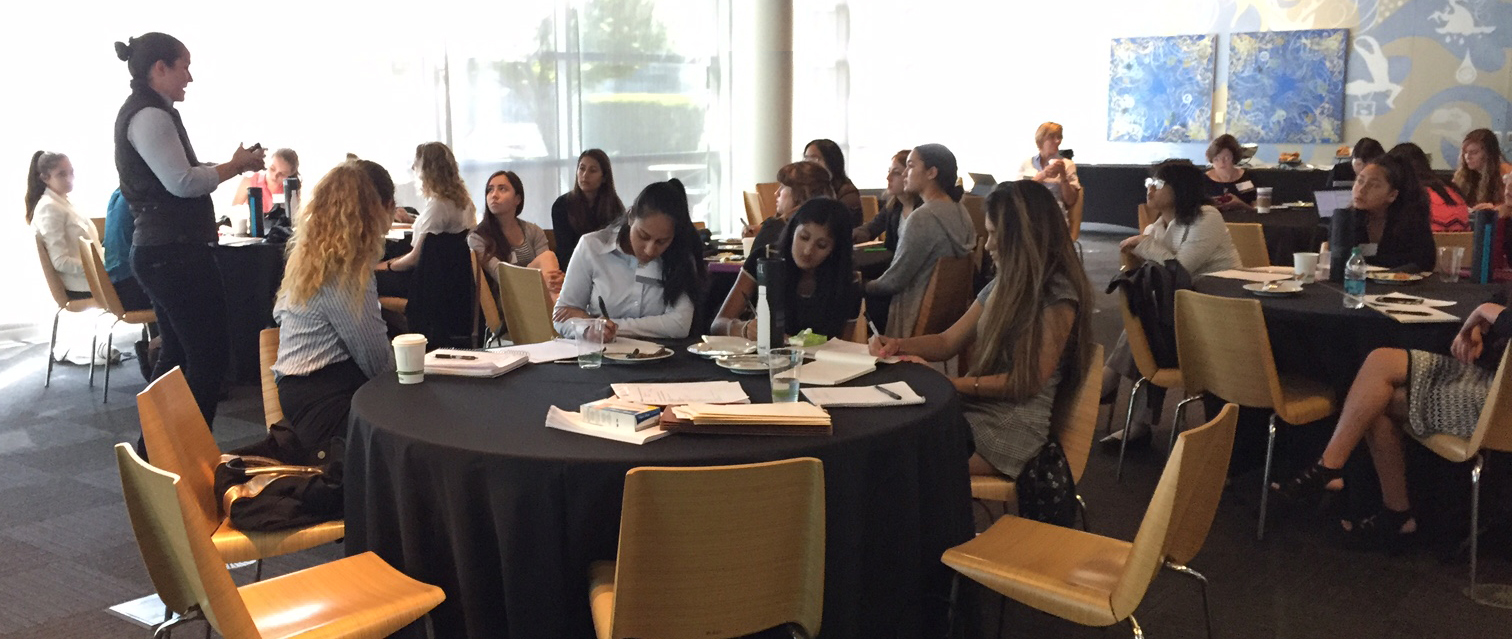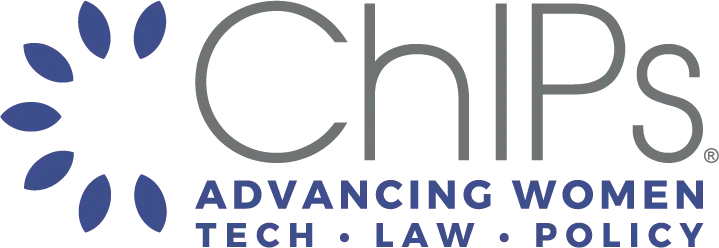One of ChIPs’ core commitments is to motivate, educate, and inspire the next generation of women leaders and innovators. As one of those young women, I was fortunate to participate in the second annual ChIPs Advocacy Leadership Innovation (ALI) Program for Teen Girls.

Day 1: Understanding Terms, Gaining Knowledge, Observing First-Hand
We kicked off the curriculum at UC Hastings College of the Law with a lesson about the rudiments of the law and the US legal system while simulating a law school class with Hastings Professor Shashi Deb peppering us with questions. Throughout the session, we were challenged to consider questions we’d be faced with over the next two days such as “What is legal precedent?”, “Is the law changing?”, and “How does the law change?” We also reviewed the Waymo vs. Uber order provided to us before the session, and learned how to identify significant parts of a judicial opinion and familiarized ourselves with the acronym IRAC.
Before heading over to Judge Ilston and Judge Kim’s courtrooms, we were debriefed on proceedings we would see in court. One group observed a civil trial arising from a plaintiff who claimed that a local police department used excessive force in removing him from a hotel in 2008. The group was fortunate to see the plaintiff himself take the stand and retell his story, and shocked to later learn that the plaintiff is incarcerated and had come to the courtroom wearing chains around his ankles.
In Judge Kim’s courtroom, we observed law and motion, including four “mock” IP motions (trademark, patent, and copyright infringement). First, we observed a motion to dismiss arising from a case in which a UC Santa Cruz student filed a lawsuit for violation of her first amendment rights and due process after being disciplined by the University for protesting with other activists and blocking Highway 1. Although the case was complex because of the legal defenses raised (Younger Abstention doctrine and Eleventh Amendment Immunity), and the facts (complication with the plaintiff’s financial aid situation and status), we were amazed to see the two attorneys argue their cases to the judge back and forth, and impressed by how quickly the attorneys could think on their feet. We next observed four intellectual property cases, thanks to Judge Kim, who scheduled a morning in which young associates argued mock motions on cases that were previously decided/in different stages. The young attorneys were poised, clearly articulated their positions, and answered Judge Kim’s questions in a manner that we understood. One of the cases included a trademark case in which Swerve, a company that sells natural sweetening products sued Wrigley, the gum and candy company, for trademark infringement. Through listening to the young lawyers, we learned about the concept of irreparable harm, as one attorney after another argued that their client would suffer significant damages to their brand, images, and sales, which could not be compensated with monetary damages if the other company was permitted legally to use their products or trademark.
After an exciting few hours, groups from both courtrooms reunited in Judge Kim’s courtroom for a Q&A with the associates that had argued the mock motions, the externs, and even the two judges themselves. The courtroom personnel were happy to answer our questions, and very supportive of ChIPs’ mission to advance young women. They were even happy to explain the cases to us when our questions were simply “What just happened?” They also discussed their most notable challenges as well as favorite aspects of their work: Judge Kim talked about dealing with cases that go completely differently than she expected and cases in which she becomes emotionally involved, and Judge Illston explained the challenges of directing a jury to disregard information, even when it is it goes against our human nature to compartmentalize important facts about witnesses or the plaintiff or defendant. Moreover, they were kind enough to stay through their free time to further the discussion with us over lunch.
In the afternoon, we debriefed the day and spoke with Lucina Rios, a UC Hastings student, to learn about daily life as a law student and the opportunities that come with a degree in law. She shared her personal journey to law school, including being the first person in her family to acquire a graduate degree, and gave us tips for starting on the path to law school. She assured us that although law school is immensely difficult, the lasting benefits, such as learning oral and written advocacy skills, make the experience worth it. We were inspired by her passion and ambition, and impressed that she was thriving in the professional world even though she hadn’t yet finished her degree.
Day 2: Uncommon Journeys, but Shared Passion
We arrived at Orrick LLP at 8:30 a.m. on Wednesday and were greeted with breakfast pastries, a gift of Swell water bottles from the ChIPs program, and a team of welcoming attorneys. Emily Hostage added to the excitement with her presentation on intellectual property. We learned about the four types of IP (trademarks, trade secrets, copyrights, and patents) and discussed the elements that qualify information as protected IP. Emily was happy to answer all our crazy hypotheticals about patent infringement, and we soon dove into a conversation about intellectual property law across continental boarders. To follow up the applications of intellectual property law, Orrick attorneys Cathy Lui and Johanna Jacob then went over trade secret law and the Waymo vs. Uber case with us in more depth. In addition to learning the details of the case, Cathy and Johanna’s questions prompted us to think about examples of trade secrets we have seen in our daily lives. For example, we discussed how Coca Cola’s recipe and The New York Times’ Best-Sellers List are famous trade secrets that have allowed these companies to thrive and dominate their industries for years.
After Cathy and Johanna’s thought-provoking presentation, a panel of female Orrick attorneys shared their professional experiences and answered our questions. We were enthralled by their diverse paths – some had majored in engineering or science in their undergraduate studies; some had studied social science majors; some immediately went to law school after college, while others had varied experiences such as working in engineering or construction; some knew they wanted to be a lawyer from first grade, while others vowed to “keep their head down and get good grades” until they finally found a calling with law. What they did have in common was a fierce passion for their work, an appreciation for each other and a shared desire to advance a society in which women are able to find more and more success in areas of law and technology. I was personally very grateful that these mentors shared their most difficult experiences as female attorneys in the field – stories like being mistaken for the courtroom clerk, being left off emails in a case, or being treated condescendingly by male attorneys or supervisors. After the panel, we shared even more intimate conversations over lunch. I loved talking with the attorneys at my table about what makes their work so special, dealing with challenges of losing a case, and feminism in general.
An Unforgettable Experience
Over the two-day exercise, we gained an understanding about the importance of protecting IP, and a heightened interest in the Waymo vs. Uber case. Moreover, we walked away optimistic about the possibility of a career in law and/or technology and about finding success in our careers as females in a male dominated society. In fact, we vowed to “View ourselves as equal to everyone else in the room, not as the only woman in the room,” as stated by one of the attorneys who urged us to respect ourselves and demand respect from our colleagues. When the 24 of us left Orrick that day, we were inspired, more curious about law and intellectual property, and immensely grateful to have met so many brilliant female role models and mentors.
